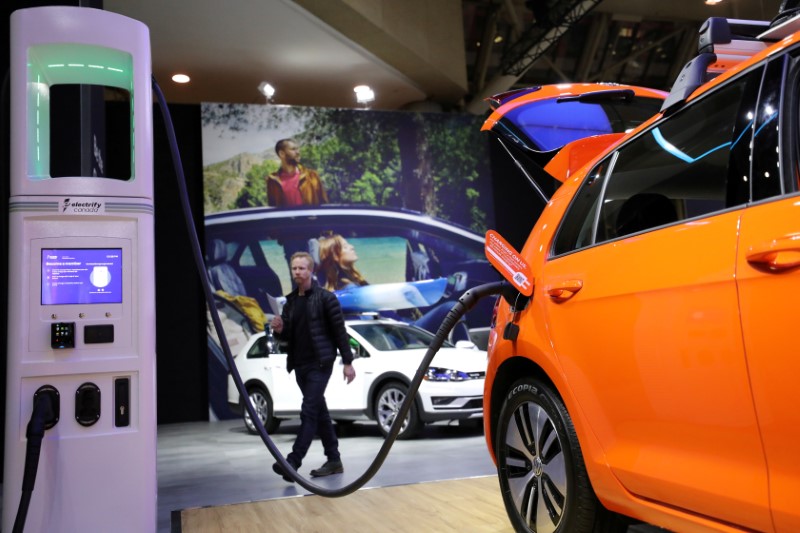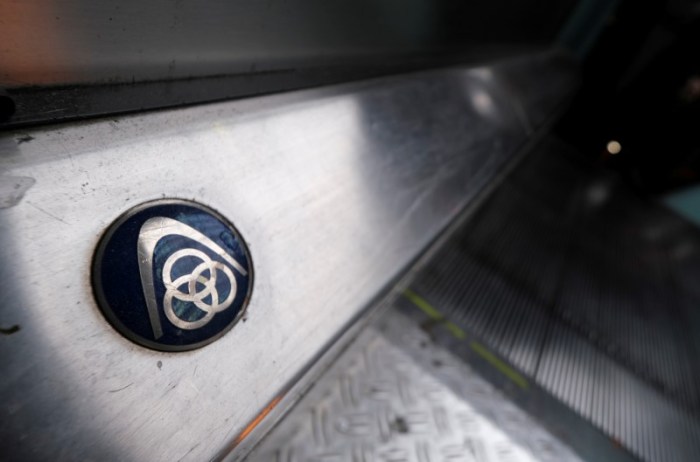BERLIN/FRANKFURT (Reuters) – Germany has become the second major European economy to use a multi-billion-euro recovery plan to spur clean driving, with incentives for electric cars that should boost Volkswagen <VOWG_p.DE> and Tesla <TSLA.O>, while polluting SUVs face higher taxes.
Berlin’s 130 billion euros ($147.41 billion) coronavirus stimulus plan follows French President Emmanuel Macron’s pledge to make France the top producer of clean vehicles in Europe.
Germany doubled electric car subsidies, lowered value added tax (VAT) to 16% from 19%, and rejected an auto industry request to incentivise vehicles with internal combustion engines in favour of a plan to increase charging infrastructure.
German fuel stations will be required to provide electric vehicle charging, transforming opportunities to refuel zero-emission cars that consumers have shunned in part because of concerns over their range.
Electric cars, which made up only 1.8% of new passenger car registrations in Germany last year, will be boosted by a 6,000 euro incentive for electric cars that cost below 40,000 euros.
This brings consumer incentives for electric cars in Germany to 9,000 euros once a 3,000 euro manufacturer stipend is included.
According to Germany’s Federal Office for Economy and Export, BAFA, the cars eligible for the full subsidy include the BMW i3, Hyundai’s Ioniq and Kona models, Kia’s E-Nero, Peugeot’s electric 208, Renault’s Zoe and Tesla’s Model 3.
Tesla and VW, which is readying a mass market push for its ID3 model, will be well-placed to flood the market with the help of the stimulus measures, analysts said. Tesla’s Model S and the Mercedes EQC are eligible for subsidies, but not for the full amount.
German new car sales fell 49.5% in May following a 61.1% slump in April, leaving thousands of petrol and diesel engine cars unsold and analysts questioning whether demand will recover from a coronavirus-induced slump.
“The lowering of VAT will hardly provide an impetus,” said Peter Fuss, a partner at EY, adding electric cars were still too niche to lift the overall market.
Germany will overhaul its motor vehicle tax. From January 2021, cars with emissions higher than 95 grams of CO2 per kilometre will face increased levies. This benefits hybrid vehicles in the short term, but a staggered CO2 tax treats them as only an interim way to cut pollution.
The average emissions of a new car last year in Germany was around 150.9 grams of CO2 per kilometre. The popularity of SUVs increased average emissions of new cars to 154.8 grams per kilometre in May.
Berlin’s plans are a rebuff to the German auto industry’s lobbying efforts and are more radical than the French programme, which includes a scrappage scheme that boosts sales of petrol and diesel vehicles.
“The VDA regrets that the stimulus plan only partially included the auto industry’s proposals for a broad and immediate economic impulse,” German auto industry association VDA said on Thursday.
Environment campaigners welcomed the investment in electric transport that chimes with European Union ambitions to cut net emissions to zero by 2050.
“This is exactly what’s needed to support jobs and help us emerge stronger and greener from the COVID crisis,” Stef Cornelis, Germany director for campaign group Transport & Environment, said.
(Reporting by Markus Wacket in Berlin and Edward Taylor in Frankfurt; additional reporting by Jan Schwartz in Hamburg; editing by Michelle Martin and Barbara Lewis)



















